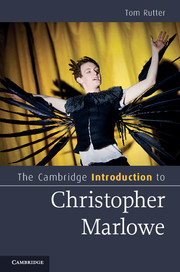Book contents
- Frontmatter
- Contents
- Illustrations
- Preface
- Key dates
- Chapter 1 Life and historical contexts
- Chapter 2 Tamburlaine, Parts One and Two
- Chapter 3 Doctor Faustus
- Chapter 4 The Jew of Malta and The Massacre at Paris
- Chapter 5 Edward II
- Chapter 6 Dido, Queen of Carthage and Marlowe’s poetry
- Chapter 7 Marlowe’s afterlives
- Bibliography
- Index
Chapter 4 - The Jew of Malta and The Massacre at Paris
Published online by Cambridge University Press: 05 June 2012
- Frontmatter
- Contents
- Illustrations
- Preface
- Key dates
- Chapter 1 Life and historical contexts
- Chapter 2 Tamburlaine, Parts One and Two
- Chapter 3 Doctor Faustus
- Chapter 4 The Jew of Malta and The Massacre at Paris
- Chapter 5 Edward II
- Chapter 6 Dido, Queen of Carthage and Marlowe’s poetry
- Chapter 7 Marlowe’s afterlives
- Bibliography
- Index
Summary
At the beginning of The Jew of Malta, the Prologue is delivered by a character who announces himself as ‘Machevil’:
Albeit the world think Machevil is dead,
Yet was his soul but flown beyond the Alps,
And, now the Guise is dead, is come from France
To view this land and frolic with his friends.
‘Machevil’ is a punning contraction (‘Make-evil’ or ‘Much-evil’) of the surname of Niccolò Machiavelli (1469–1527), author of (amongst many other works) Il principe (The Prince), the notorious treatise on government. It isn’t known for certain whether Marlowe actually read any of Machiavelli’s writings, which were available in Latin and French translations as well as in Italian in early modern Europe. Rather, the Machevil on display here reflects (consciously or not on Marlowe’s part) the widespread, somewhat inaccurate view of Machiavelli as a diabolical atheist who ‘teacheth the prince to be a true contemner of God and religion’ in the cynical pursuit of power (the quotation is from a 1602 translation of Innocent Gentillet’s widely read 1576 treatise against Machiavelli). As this figure is more mythical bogeyman than historical individual, it’s appropriate to retain Marlowe’s version of his name (although I have used the spelling ‘Machiavel’ as a generic term for other Machiavellian characters).
In the speech that follows, Machevil goes on to introduce the play’s main character Barabas as one whose ‘money was not got without my means’ (32) and to ask the audience not to let the fact that ‘he favours me’ (35) prejudice them against him. Yet some in the audience, it is suggested, might be more familiar with Machevil than they let on: he has ‘friends’ here in England, and his soul has flown over to meet them ‘now the Guise is dead’. Machevil is imagined as having posthumously consorted with Henry I, Duke of Guise, another hate-figure for many English as a Catholic leader and architect of the massacre of thousands of French Protestants before and after St Bartholomew’s Day (24 August) 1572. The reference to his death in December 1588 means that we can date The Jew of Malta to 1589 or later (although presumably not so much later as to make the line seem irrelevant). It also provides one reason for considering the play alongside The Massacre at Paris (which seems to have been first performed in January 1593 and as such may be Marlowe’s last), in which the Guise is a central figure: indeed, Philip Henslowe’s theatrical records frequently refer to the play simply as ‘The Guise’.
- Type
- Chapter
- Information
- The Cambridge Introduction to Christopher Marlowe , pp. 61 - 78Publisher: Cambridge University PressPrint publication year: 2012



